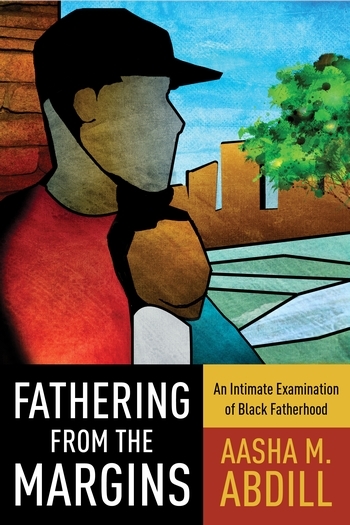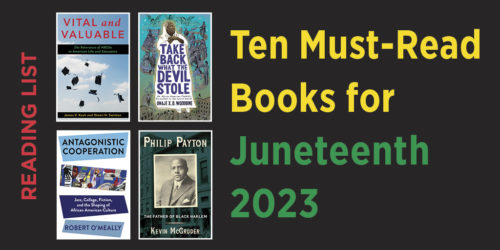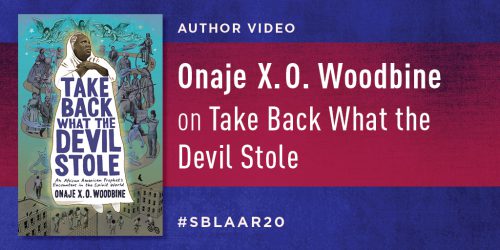Celebrate the Contributions of Black Americans to History and Culture
The New Press Takeover

Today, on Juneteenth, our friends at Columbia University Press have graciously shared their platforms to highlight books published by The New Press that speak to our present moment. Juneteenth is of course the oldest nationally celebrated commemoration of the end of chattel slavery in the United States, and we have highlighted the New Press books that honor the continued struggle for Black liberation, that correct a whitewashed historical narrative, and that confront the mechanisms of systemic racism at play in our society.
Before joining The New Press, I had the great pleasure of being a publicist at Columbia University Press. While working on today’s New Press posts for Columbia University Press’s blog, Twitter, Facebook, and Instagram, I couldn’t help but think of the important titles that Columbia has published that celebrate the contributions of Black Americans to history and culture and whose scholarship exposes racism in our past and present. Below is a selection of some of the titles that are on my shelves at home, books that I wholeheartedly recommend.
• • • • • •
Down the Up Staircase
Three Generations of a Harlem Family
By Bruce Haynes and Syma Solovitch
Down the Up Staircase tells the story of one Harlem family across three generations, connecting its journey to the historical and social forces that transformed Harlem over the past century. Haynes and Solovitch capture the tides of change that pushed blacks forward through the twentieth century—the Great Migration, the Harlem Renaissance, the early civil rights victories, the Black Power and Black Arts movements—as well as the many forces that ravaged black communities.
Fathering from the Margins
An Intimate Examination of Black Fatherhood
By Aasha M. Abdill
Sociologist Aasha M. Abdill draws on four years of fieldwork in low-income, predominantly Black Bedford-Stuyvesant, Brooklyn, to dispel destructive assumptions of Black men as “deadbeat dads.” She shows how supporting Black men in their quest to be—and be seen as—family men is the key to securing not only their children’s well-being but also their own. Abdill wrote a blog post when Fathering from the Margins was published about racism and fathering.
Shadow Archives
The Lifecycles of African American Literature
By Jean-Christophe Cloutier
Recasting the history of African American literature, Shadow Archives brings to life a slew of newly discovered texts—including Claude McKay’s Amiable with Big Teeth—to tell the stories of black special collections and their struggle for institutional recognition. You can read an excerpt from the book about the author Ann Petry in Lit Hub
Black Gods of the Asphalt
Religion, Hip-Hop, and Street Basketball
By Onaje X. O. Woodbine
Streetball is rhythm and flow, and during its peak moments, the three rings of the asphalt collapse into a singular band, every head and toe pressed against the sidelines, caught up in the spectacle. Basketball is popular among young b Black men, not simply because of the allure of a professional career. Black men choose to participate in basketball because of the transcendent experience of the game. Through interviews with and observations of urban basketball players, Onaje X. O. Woodbine composes a rare portrait of a passionate, committed, and resilient group of athletes who use the court to mine what urban life cannot corrupt. If people turn to religion to reimagine their place in the world, then black streetball players are indeed the adepts of the asphalt. Woodbine is himself a former streetball player who became an All-Star Ivy Leaguer, and brings the sights and sounds, hopes and dreams of street basketball to life
Hubert Harrison
The Voice of Harlem Radicalism, 1883-1918
By Jeffrey B Perry
The foremost Black organizer, agitator, and theoretician of the Socialist Party of New York, Harrison was also the founder of the “New Negro” movement, the editor of Negro World. More than any other political leader of his era, Hubert Harrison combined class consciousness and anti-white-supremacist race consciousness into a coherent political radicalism. Author Jeffrey Perry’s second volume on Harrison comes out later this year.
Race and Real Estate
Conflict and Cooperation in Harlem, 1890-1920
By Kevin McGruder
Author Kevin McGruder offers an innovative perspective on the history of Harlem throughout the lens of real estate transactions from 1890 to 1920. One that reveals the complex interactions between whites and African Americans at a critical time of migration and development when the neighborhood saw dramatic shifts in population.
These titles, and others from Columbia University Press and The New Press, are available for purchase on Bookshop, a new online bookstore with a mission to help support brick and mortar independent bookstores and the book community.







